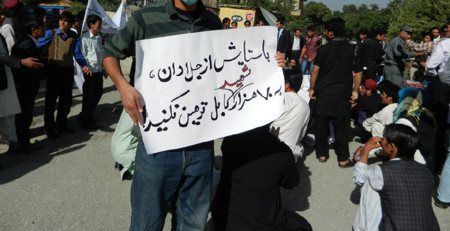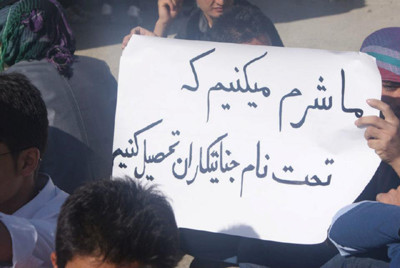By Frud Bezhan
Public tributes to Afghanistan's fallen national heroes are readily apparent to any traveler driving through the country's capital, where scores of prominent streets, squares, and schools have been renamed to honor the dead.
But deciding just who is a national hero and who is a national villain has proved highly contentious, a byproduct of conflict among rival and even warring ethnic, religious, and political groups.
Each has their own interpretation of the country's bloody history, and a figure idolized by one side is likely to be abhorred by another.
There have been numerous examples in the past decade.
There was the Afghan government's decision to honor Ahmad Shah Masud, the powerful ethnic Tajik militia commander who was assassinated in 2001, by naming Kabul's main airport road the "Great Masud Road."
And there was the decision to honor Abdul Ali Mazari, a Hazara leader who was killed by the Taliban in 1995, by naming a Kabul square "Martyr Mazari Square."
Each led to an equal measure of support and backlash within Afghanistan's fractured society.
'Martyr Of Peace'
The latest controversy to erupt came after Afghan President Hamid Karzai issued a decree on September 20 ordering that a university in Kabul be renamed after Burhanuddin Rabbani.
The ethnic Tajik Rabbani served as president of the postcommunist, pre-Taliban Islamic State of Afghanistan from 1992-96, and later as the temporary president of the country immediately after the Taliban was toppled in 2001.
Admirers have dubbed him the "Martyr of Peace" for his role as head of the High Peace Council in trying to reconcile with the Taliban, which cost him his life when he was assassinated in 2011 by a Taliban suicide bomber posing as a peace envoy.

Sep. 29, 2012: Protest in front of the parliament by hundreds of students against the renaming of the Kabul Education and Training University to defamed warlord, Burhanuddin Rabbani's name. The placard reads: Don't insult the 70,000 martyrs of Kabul by praising murderers!

Sep. 29, 2012: A woman holds a placard reading "We are ashamed to study under the name of a criminal."
Rabbani's detractors note that he was accused of gross human rights abuses while commanding his forces during the country's brutal civil war.
Reports have emerged that Karzai also plans to rename Kandahar airport, in the country's Pashtun-dominated south, after Rabbani, whose power base resided primarily in the country's north.
Students have responded to the renaming of the Kabul Education and Training University by staging daily protests that have effectively closed down the institution.
The rallies have brought together hundreds of students since Karzai's September 20 decree, timed to coincide with the first anniversary of Rabbani's assassination.
On September 29, demonstrators locked arm-in-arm blocked the entrance to the parliament building, forcing its temporary closure.
Among them was Nulifar, who declined to provide her full name. The 24-year-old literature student believes the decision to rename her university to "Martyr Professor Burhanuddin Rabbani University" could politicize the institution and promote conflict among its ethnically diverse student body.
"On the one hand, we are a week behind in our studies and it's putting our education in jeopardy," she said. "When we go to study, we are not at peace because, if there wasn't a threat from our enemies before, there will be now. If people like this [Rabbani] did something good we respect them, but they're also immersing us in politics."
Demonstrators like Nilufar have been careful not to provoke the fury of Rabbani's supporters, with many praising the ex-president and avoiding direct criticism.
Many have also been keen to emphasize that the rallies are not ethnically motivated, insisting that the protestors represent a "national group."
Kabir, a 25-year-old engineering student, says he does not have a problem with Rabbani. He suggests that renaming the university after any ethnic leader would have provoked similar protests.
"If the government really respects peace and freedom, let them build another university and name it after the Martyr of Peace," he said.
List Of Grievances
In a statement released on October 1, the organizers of the protest called the government's decision to rename their institution a "great mistake" and vowed to continue demonstrating until their demands are met.
It also says the group has contacted the Afghan parliament and the Independent Human Rights Commission several times to gather support for their cause, although they have so far been unsuccessful.
The statement goes on to list several of the group's grievances.
It says hundreds of Afghan police have been summoned to the university in a bid to intimidate protestors. The statement claim police have beaten protestors and shot bullets in the air in an effort to disperse the demonstrations.
The statement also accuses lawmaker Qazi Nazir Hanafi, from western Herat Province, of running over and injuring several protestors on September 2 when they blocked his car's entrance to parliament.
Hanafi has denied the allegations, telling the Afghan TV channel TOLOnews that "the protestors were blocking the way when my car was entering parliament and started punching the mirrors. But I am not complaining about it."
Several prominent Afghan lawmakers have also backed the protests, including Ramazan Bashardost, a former independent presidential candidate and a member of parliament.
Bashardost maintains that the government should reconsider its decision and leave it to the Afghan people to decide whom they want to honor.
"Somebody is a traitor or a servant of the country; a patriot or an enemy of the country," he said. "We have to let the Afghan people decide for themselves. For 40 years, there has been war and misfortune in Afghanistan. The Afghan people are not stupid. The Afghan government should listen."
The controversy over the tributes to Rabbani comes amid rising public scrutiny of the country's controversial former warlords and militia leaders, many of whom still wield significant influence on the country's political affairs, much to the chagrin of their detractors.
Written and reported by Frud Bezhan, with additional reporting by RFE/RL's Radio Free Afghanistan



